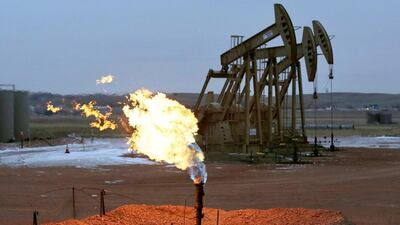Oil prices continued to rise amid simmering tensions in the Middle East and falling rig counts in the US, signalling a bullish outlook in the near term.
The price of Brent gained 1.47 per cent and was trading at $64.23 per barrel at 11.24am UAE time on Friday as data from US energy services company Baker Hughes revealed that domestic US rig counts had fallen by four last week.
Tensions in the Middle East, which have been building up since the US threatened to launch strikes against Iran last month for shooting down one of its drones, spilt over into international waters. Around the British Overseas Territory Gibraltar on Spain's southern coast, the UK seized an Iranian tanker thought to be bound for Syria. The tanker was seized by British forces for violating EU sanctions on Syria. British marines detained the Grace 1 super-tanker early on Thursday, said the UK territory's chief minister, Fabian Picardo.
Tehran, in retaliation, threatened to seize a British vessel.
"If Britain does not release the Iranian oil tanker, it is the authorities' duty to seize a British oil tanker," Mohsen Rezaei, a member of a council that advises the Supreme leader, Ayatollah Khamenei, wrote on Twitter, according to the BBC.
There have recently been incidents of attacks on tankers in the Arabian Gulf. Two vessels carrying crude from Saudi Arabia and the UAE were damaged last month. The US blamed Iran, which denied any involvement.
In May, four tankers off the coast of Fujairah were attacked in what authorities said appeared to be “sabotage”.
Oil prices reacted bullishly to the regional tensions around mid-June but remained muted following the recent Opec+ deal to extend production cuts until March next year.
The alliance of producers led by Saudi Arabia and Russia have held back 1.2 million barrels per day since the beginning of the year.
Analysts expect prices to react moderately for the rest of the year.
“The combined Opec+ [excluding Iran, Libya, and Venezuela] output cuts since January 2019 have resulted in production falling by [about] 1.8 million bpd, due to over compliance by a number of member countries,” said Monica Malik, chief economist at Abu Dhabi Commercial Bank.
“We believe that over compliance by the Opec+ group will reduce in the coming months, with increasing global demand over the summer months likely resulting in producers boosting output,” she added.
Swiss lender UBS expects US production to slow to 1.4 million bpd this year, from the high of 2.2 million bpd seen last year, due to increased "capital discipline" in exploration and production in the shale basins. The bank forecasts Brent to exceed $70 per barrel over the coming months as Opec+ drains oil inventories.
Concerns remain about the US and China reaching an agreement in their trade dispute. There was some optimism over them restarting talks on the sidelines of the G20 meet in Japan last week.
The US and China standoff, as well as slowing demand, caused oil prices to fall to their lowest since January at the beginning of June. However a “mild winter” could have also contributed to the slowdown in demand for the first quarter of 2019, UBS said.


